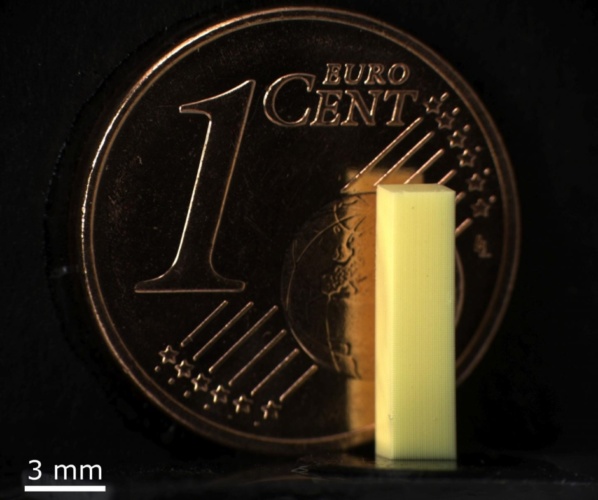
The research matches the requirement from industry for 3D printers to work at the micrometre scale at far higher speeds. This system is presented in Advanced Functional Materials.
In the frame: the 3D printed bike
Blood vessels embedded into 3D printed skin
To demonstrate the speed and reliability of their setup, the researchers at the Karlsruhe Institute of Technology (KIT) printed a lattice structure of 60mm3 in size with details down to the micrometre scale and containing over 300 billion voxels, the 3D equivalent of pixels.
"We have by far outperformed the record reached by 3D-printed aircraft wings. This is a new world record," said Prof Martin Wegener, spokesperson for 3D Matter Made to Order (3DMM2O), a collaboration between KIT and Heidelberg University.
For this type of 3D printing, the beam of a laser passes a liquid photoresist in a computer-controlled manner. The material located in the focus of the laser is exposed and hardened.
"The focal points correspond to the nozzles of an inkjet printer, the only difference being that they work three-dimensionally," Vincent Hahn, first author of the publication, said in a statement.
In this way, KIT claims, highly precise filigree structures can be produced for various applications, such as optics and photonics, material sciences, bioengineering, or safety engineering.
Typically, several hundred thousands of voxels per second have been produced with a single laser light spot so far. This means that it was nearly a hundred times slower than graphical inkjet printers, which impeded many applications so far.
Scientists of KIT and Queensland University of Technology (QUT) in Brisbane, Australia have now developed a new system within the 3DMM2O Cluster of Excellence.
Using special optics, the laser beam is divided into nine partial beams that each focus on a focal point. All nine partial beams can be used in parallel and, thanks to improved electronic control, can be moved precisely and more rapidly.
This and some other technical improvements made the researchers reach 3D printing speeds of about 10 million voxels per second, which corresponds to the speed reached by graphical 2D inkjet printers. KIT said it will continue research and development in this area.




Poll: Should the UK’s railways be renationalised?
Rail passenger numbers declined from 1.27 million in 1946 to 735,000 in 1994 a fall of 42% over 49 years. In 2019 the last pre-Covid year the number...